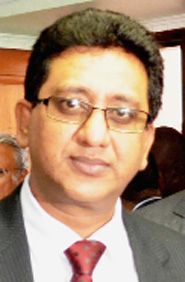Government could tap funds for snap elections from the Contingency Fund based on the ruling of the Chief Justice in the budget cuts case, according to Attorney-General Anil Nandlall.
“The Chief Justice ruling in the budget cuts case has paved the way for the government to go to the Consolidated Fund and then seek the ex post facto imprimatur of the National Assembly whenever there is an insufficiency of funds for an agency if in the opinion of the Minister of Finance, it is necessary to do so,” Nandlall told Stabroek News in response to queries about funding for the Guyana Elections Commission (Gecom) should snap elections be called.
A year after general elections and with acrimonious exchanges between the political parties in the National Assembly, there has been increasing speculation about the possibility of snap elections.
“That power which resides with the Minister of Finance is one that is given by the Constitution,” Nandlall said. “Applying that provision of the Constitution, if there is any eventuality arising for government to address and there is insufficient funding to do so, that provision allows funding to be accessed from the Consolidated Fund,” he asserted. “Theoretically and hypothetically, that is possible,” he said in responding to whether the ruling meant that the government would not necessarily have to seek the approval of the National Assembly for funding for snap elections.

In April, the opposition effected over $20 billion in cuts from the budget, citing a lack of transparency and accountability in the explanations for the allocations. The government later moved to restore the amounts through an action in the High Court. Although finding that the National Assembly did not have the power to cut the budget, acting Chief Justice Ian Chang in July, in an interim ruling, said the court could not restore the funds, except for allocations to the Ethnic Relations Commission which is a constitutional agency and entitled to draw directly from the Consolidated Fund.
Among those affected by the cuts were contract workers at the Office of the President and employees at other affected state entities who were all later paid. Head of the Presidential Secretariat, Dr Roger Luncheon had said that that the $1 that was approved by the opposition for the various agencies was totally inconsistent with the constitutional provision as ruled by the Chief Justice. “The Constitution says for a maximum of four months every year in the absence of a budget, the Finance Minister could withdraw from the Contingency Fund, wages and salaries whatever it takes to run the government,” he had said while explaining how money was found to pay the workers.
“The provision of a $1, the Chief Justice ruled was clearly inconsistent with that provision in the law so the Finance Minister did what the law provided for and made the money available to meet those expenditures,” he had said.
Meantime, when questioned about funding for Gecom should snap elections be called, Deputy Leader of the main opposition APNU, Dr Rupert Roopnaraine, said that the House would have to approve the funds. “All funding for Gecom has to come out of the Consolidated Fund and Parliament is the guardian of the Consolidated Fund,” he said.
Roopnaraine said government would have included the funding in the budget or alternatively in a supplementary financial paper. “Parliament will have to know what the money is for,” he said. He said that he did not believe that there is much of a danger in springing snap elections. He said that should President Donald Ramotar decide to dissolve Parliament and call elections, he would have to have calculated from where the money would come. He noted that local government elections are slated for next year and the money approved for this exercise has to be spent on it and could not be diverted.
Following elections last year, the combined opposition, APNU and AFC, hold a one seat majority in the National Assembly while the PPP holds the presidency, creating a unique situation where both the President and the combined opposition can trigger another election before the five-year constitutional deadline.
Nandlall had told Stabroek News previously that the power to call an election resides predominantly with the executive arm of government. He had indicated that the President is free to call an election at any time during his/her term in office. If such a decision is made by the President, Nandlall had said, Gecom will have to be told to ready itself for the holding of polls.
However, government could also be forced to hold new elections if it is defeated by a no-confidence motion passed in the National Assembly. In such a scenario, the Cabinet will have to resign although the government will remain in office until the elections are held within three months of the passing of the motion.
Article 106 of the Constitution says that the cabinet, including the president shall resign if the government is defeated by the vote of a majority of all the elected members of the National Assembly on a vote of no confidence. Further, it says notwithstanding its defeat, the government shall remain in office and shall hold an election within three months, or for a longer period determined by a vote of two-thirds of the assembly. The government would then resign after the new president takes the oath of office following the election.
Roopnaraine had also previously told Stabroek News that the government could hold an election at any time under Article 70 of the Constitution without any prerequisites.
Article 70 (1) of the Constitution says the President may at any time by proclamation prorogue Parliament, while (2) says that the President may at any time by proclamation dissolve Parliament. Once Parliament has been dissolved under normal circumstances, elections should take place within three months.





